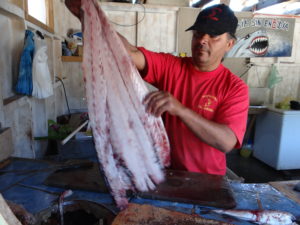Last Wednesday, February 27, marked the third anniversary of an 8.8-magnitude earthquake that struck off the central coast of Chile, triggering a massive tsunami that destroyed homes, businesses, and lives.

A week before the anniversary, I traveled to one of the most hard-hit areas, where the Red Cross is working with communities to not only help them recover from the double disaster, but also to be prepared for future disasters.
Recovery is about more than just rebuilding an area that was affected by a disaster. At its core, it’s about helping people who’ve often lost everything to regain their footing and restart their lives, both physically and emotionally.
During my conversations with locals, I was genuinely moved by their sincerity and eagerness to tell their stories. One of my colleagues remarked how distressing it was for her to assist me with translating some of our conversations, namely my questions about how they survived.
The truth is, asking those questions used to be difficult for me. But the more I’ve talked with people, the more I’ve realized that when they share their stories with me, they are more than just sharing a story; they’re continuing their healing process.
When I met Nelson Valenzuela, an owner of a fish stand off the side of the coastal road running the through Licantén, Chile, he didn’t just take time to sit down and chat with me. He made lunch for our team – the best fish I’ve ever had.

We sat together enjoying our meal while he told us how just three years earlier the same ocean at our backs rose, in three separate waves, to overtake his home and community.
He told us how he was driving back from Santiago early that morning when he felt and saw the road start to wave under him. Three minutes later, he was racing back home but was blocked by rubble so he had to flag down another car to take him home, even though everyone was fleeing from that direction.
“I tried calling my wife and my brother, but nothing was working. We were finally at least able to connect to Argentine radio to hear the tsunami warning. When we came across some police and asked them for information we actually knew more than they did,” Nelson said.
Nelson lost everything short of his life and his family. Prior to the disaster, he had a successful business that afforded him a nice home. But because of the economy, he didn’t trust the banks, so all of his savings were hidden around his home and properties.
He and his family spent 15 days in the hills behind their home, living in tents and cooking with kitchen kits provided by the Red Cross.
“It was extremely traumatizing,” he said. “To have worked so hard, my whole life, and lose it all… I didn’t want to go back there.”
So, he started from scratch in a neighboring town and built his fish stand. Now he spends his days with his children at his side, preparing and selling fish while chatting with neighbors and tourists.
